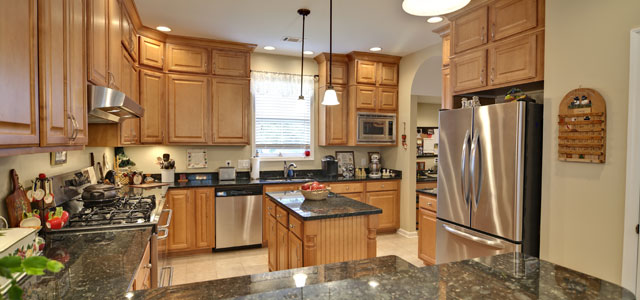Granite is a beautiful and durable stone that looks great in any kitchen or bathroom. It is a natural material that requires some love and care to maintain its luster. Granite, like many other natural products, can be porous. The porosity of your granite depends on a variety of factors such as type, where it originated from, and/or where the piece was cut from a bigger slab. Porous materials can suck up and harbor harmful bacteria, grease, and other liquids that may stain the rock or pose health risks. Granite countertops in the kitchen or bathroom are especially prone to soaking up the wrong things. Raw meat, spilled wine, mouth wash, and toothpaste are all common in these rooms and can ruin a perfectly good counter that has not been sealed. Sealing your granite countertop fills the pores of the granite and takes away its ability to absorb other fluids.
To keep a porous granite countertop in perfect shape, it should be sealed regularly. If used consistently, your countertop may need to be sealed twice a year due to gradual wearing off of the previous seal through general usage or cleaning of the surface. Some household cleaners can cause the seal’s bond to weaken at an increased rate. At the very least, the granite should be sealed on an annual basis.
It is very easy to test whether your counter needs to be sealed to protect against water-based and/or oil-based stains. There are two ways to check if your slab is susceptible to water-based stains:
1) place a white paper towel or cotton cloth soaked in water on top of the granite and wait for about 10-15 minutes then, if after wiping away excess water, the spot is darker than the surrounding granite, it should be sealed; and
2) spill a small amount of water on the granite and if it soaks in instead of beading up, it is ready to be sealed. To test if the granite will soak up oil, dab some mineral oil and wait for 5-10 minutes, then wipe away. If there is a dark spot, it needs to be sealed to protect against oil-based stains. On the other hand, if there is no change in the color of the granite after water or oil, there is no need to seal it.
If it is time to seal your granite countertop, you have the choice of doing it yourself or hiring a professional. You might want to save some money and seal the counter on your own. Doing so may sound easy, but there is a specific science behind granite. As mentioned earlier, not all granite has the same porosity so your slab could either be a sponge or not porous at all. Sealing granite that does not need to be sealed or putting too much sealant on will leave a hazy look to the surface. In short, the granite should not be coated with sealant; it should be lightly reapplied if this is not the first time it has been sealed.
Sealing a granite counter can be a scary thing and may be best left to a professional. A granite expert will know just the right type and amount of sealer to use, how to use it, and get a perfect finish after application is complete. They will also already have all the needed materials to work quickly and efficiently. The advantages to having a professional seal your granite may cost money and cause some mild inconvenience, but having a shiny, tight seal is worth it. When your countertop is first installed, the company should go over with you what type of sealer, water or solvent-based, and how to correctly seal your new counter for free.
If a professional has already shown you the sealing process and/or you want to do it on your own, there are a few things you will need to do to prepare: protect surfaces you do not want sealed with masking or painter’s tape and keep the surface dry 10 to 12 hours prior to sealing time. Once the counter is completely dry, apply a thin layer of sealer with a soft cloth in long strokes and allow to dry according to the instructions on the sealer label. Apply another coat in the same way and let sink in, but before completely dry, buff the surface with a clean microfiber or cotton cloth. If streaks are present after buffing and the sealer has dried, apply a small amount of sealer and wipe away until no streaks are present.
Once you or a granite professional has sealed your countertop it can go back to being used how you see fit! Your fresh new seal gives you comfort in knowing that your beautiful granite countertop will continue looking natural without any water or oil-based stains.


